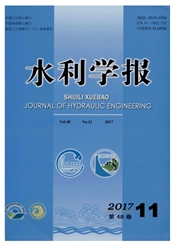

 中文摘要:
中文摘要:
建立了镇江内江水流、水质、悬沙及叶绿素a多因子耦合数学模型,对内江沉水植物恢复后产生的环境效应进行了定量评估了模型参数根据前期研究成果确定。研究结果表明:内江沉水植物恢复后,夏秋季节与冬春季节水体平均含沙量分别比天然条件下降低了约11.1%、11.5%;由于沉水植物对水体的净化作用,在夏秋季,内江TN、TP平均浓度分别降低为0.659mg/L、0.137mg/L,较恢复前分别降低了32.2%、30.8%;在冬春季,恢复后的内江TN、TP浓度较恢复前分别降低了29.5%、27.3%;沉水植物的克藻作用亦使内江叶绿素a的平均浓度降低了37.2%,可能暴发水华的面积减少了49.3%;同时,夏秋季及冬春季平均水体透明度分别提高了7.9%和14.0%。
 英文摘要:
英文摘要:
Submerged macrophytes plays an important role in aquatic system. A numerical model coupling water current with water quality suspended sediment and chlorophyll-a was established to quantitatively estimate the environmental impact on the Neijing River, Zhenjiang City, China, after submerged macrophyte restoration. The result shows that the average suspended sedmlent concentration in Neijiang River in summer-autumn period and spring-winter period were decreased by 11.1% and 11.5% respectively. Due to the purification impact of submerged macrophytes the average concentrations of TN and TP in summer-autumn period were 0.659mg/L and 0. 137mg/L, which were decreased by 32.2% and 30.8 % respectively. The average concentrations of TN and TP in spring-winter period were also decreased by 29.55 and 27.3%, respectively. As a result of allelopathic effects of maerophytes tile average chlorophyll-a concentration and the area where water bloom might happen were decreased by 37.2 % and 49.3 %, respectively. After submerged summer-autumn period and spring-winter period were macrophytes restoration the water transparency in increased by 7.9 % and 14 % respectively, because of the improvement of water quality.
 同期刊论文项目
同期刊论文项目
 同项目期刊论文
同项目期刊论文
 期刊信息
期刊信息
